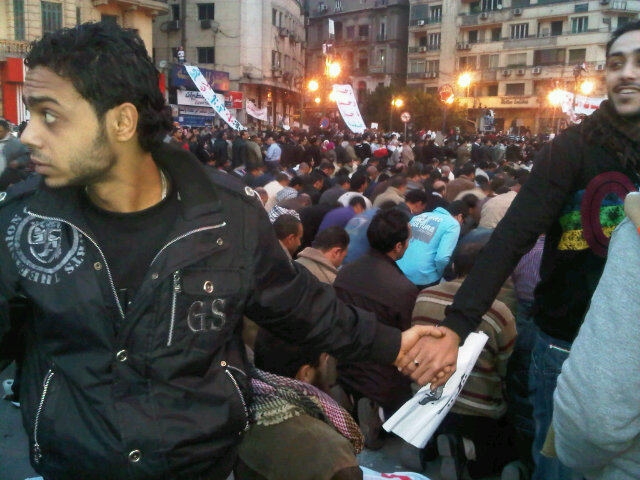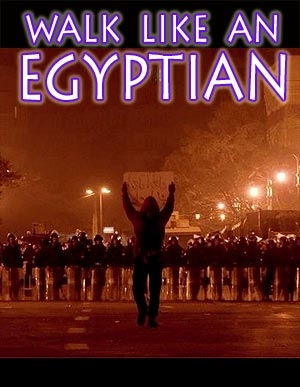Egyptian protestors hang a “closed for the duration of this revolution” sign on the parliament building.
Articles with the Tag Jan25
Egypt: the rhythm of revolution
Alex dissects the day to day rhythm of the Egyptian protests and what the likely outcomes of it might be:
The result of this is that there’s been a sort of media cycle – one day the papers are full of pictures from the latest day of rage, the next it’s all about people grandly speculating on what happens next, and the regime’s spokesmen explaining how they intend to preserve the substance of the regime. Perhaps they talk about that on the other days, but nobody is listening. Or perhaps they believe it, when they wake up and hear that there are only tens of thousands of rebels in Tahrir Square rather than hundreds of thousands. Then, the next callout of the demonstrators resets the clock again.
Today, we seem to be in one of the ebb-tide phases. So it’s a good moment for a bit of speculating. What is important, in these terms, is that the government doesn’t seem to be regaining much ground in between waves of protest. Instead, there seems to be a ratchet in operation – each wave extracts a new concession. Mubarak sacked his government. And appointed a vice president. Then he promised not to stand again. Then talks were opened with the opposition. Then the military accepted to talk directly with the opposition, independently. Then the NDP hierarchy was purged. Then Suleiman renounced becoming president himself. And the regime’s own peak effort – Wednesday’s thug raid – was dramatic and violent at the time, but with hindsight was nowhere near enough in terms of numbers to change anything. Arguably, it wrecked the government’s remaining legitimacy and only demonstrated its lack of mass support.
Alex is optimistic about the chances of the revolution succeeding; if Egypt can turn out either like Poland in 1981 or like Poland in 1989, it looks more than the latter than the former. As he argues, once past the initial stage of a revolution it takes time to change things:
Looking ahead, it’s worth remembering that 1989 took time to deliver. After the original moment of success, there was a long and uncertain haul of getting rid of specific individual bastards, changing laws, moving editors around the State TV and inspectors around the police force. I think we’re now into this phase.
I wonder whether the traditional news media understand this rhythm; so far it seems that every time the protests died down, they have been impatient to declare it over. As it continued their focus has also more and more shifted from the “democracy, whisky, sexy” angle to the grave considerations of the economic impact of the protest on Egypt and how it’s now time for the serious, moderate men to negotiate a compromise between Mubarak and the protesters. Cue numerous vox-pop bits of alleged protesters saying enough is enough and they want to go back to work now. The whole revolution just does not seem to fit their scripts and it’s noticable in how much news channels and papers keep lagging behind developments, with the noticable exception of Al-Jazeera.
I also wonder how much more impatient we’ve all become since 1989, what with very quick updating news media like Twitter and insta-reaction blogs and all that. The revolution proper is only two weeks old, but it can feel much longer following it online.
So far this is only an annoyance, but it can be a danger for the nascent revolution as well, as expectations towards its resolution shift and people are pressured into accepting “compromise”.
Egypt: Copts and Muslims looking out for each other
Juan Cole on the continuing cooperation between Muslims and Coptic Christians in the Egyptian revolution:
The Christian and Muslim intellectuals issued a joint statement, affirming that the revolution of Egyptian youth had instilled a new spirit in Egyptian souls, in which was apparent an excellent example of national unity… when believers guarded each others’ prayers after the police disappeared. They said that this decision to stand guard came from the youth themselves, not from any religious leadership, and that it demonstrated that places of worship did not need armed guards. “They are Egyptian places of worship, dear to the hearts of all Egyptians..†They recalled that [because of the New Year bombing] Egypt had been on the verge of sectarian war, and clergymen’s statements had brought the situation to an explosive point, when all that tension was stopped by the Youth Revolution.
This is one of the best results of the revolution so far, the spirit of brotherhood between Christian and Muslim Egyptians, despite the decades long repression of the Coptic Church and last year’s terror attacks on them.
Walk like an Egyptian

From Yesterday’s Al-Jazeera liveblog:
12:35pm: Our correspondent in Alexandria says tens of thousands of people have gathered in the centre of Alexandria. He says Christians and others not performing Friday prayers have formed a “human chain” around those praying to protect them from any potential disruptions.
